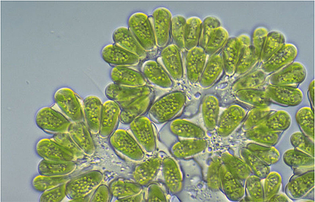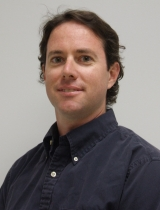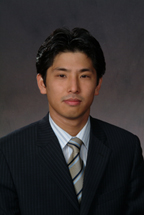It seems we can get oil from any number of unlikely substances these days, and a joint biofuel research team from Texas A&M and Cornell is trying to do just that. With a $2M grant from the NSF, researchers are studying how to extract the naturally-produced oil from algae. So next time you look at a green swimming pool, consider that a similar muck just might be able to fuel your car. Algae is an eukaryotic organism that is photosynthetic and generally aquatic, and it comes in a wide variety of forms. It can be a very small single cell organism like B. braunii or a very large multi-cellular organism like kelp. It fact algae is one of the newest and most promising subjects of research in the quest for biofuels.
Algae is a perfect organism for biofuels because, like plants, it is autotrophic and creates energy out of both the sun and inorganic compounds. Moreover, it releases oxygen as a by-product of metabolic activity, making it a very green energy source. According to Oilgae, it offers advantages over other crop products because it “can be cultivated under difficult agro-climatic conditions and is able to produce a wide range of commercially interesting byproducts such as fats, oils, sugars and functional bioactive compounds.” Once extracted, algae oil can be used for biodiesel, biogasoline, jet fuel and even bioplastics.
 |
||
|
|
Because of its ease in cultivation, rapid growth and high oil production, the NSF is fast tracking the algae research into B. braunii with the goal of taking it from the lab to commercial production in 4 years or less. The $2M NSF grant is for the project titled Microalgae Lab-on-Chip Photobioreactor Platform for Genetic Screening and Metabolic Analysis Leading to Scalable Biofuel Production. The joint research team is composed of a diverse group of research labs needed to make commerical biofuel from B. braunii a reality. The participating labs are: the Devarenne lab from Texas A&M, the Han lab from Texas A&M, the Stern lab from the Boyce Thompson Institute for Plant Research (at Cornell), the Tester group from Cornell, and Dr. Samocha from Texas A&M-Corpus Christi.
 |
| (Courtesy of Biochemistry and Biophysics) |
The Devarenne Lab is researching B. braunii to understand the genes that control oil production. The type of oil produced by B. braunii is known as botryococcenes and is used in the extracellular matrix to hold individual algae cells together in colony form. The commercial interest in B. braunii is from it's 30%-40% oil by weight, and the fact that the oil can be extracted in a form similar to 60-70% gasoline. The problem with B. braunii is that it is a slow-growing algae not suited to commercial production. To overcome this commerical shortcoming of the algae, the high oil producing genes are going to be extracted from B. braunii and placed in a fast-growing algae like Chlamydomonas reinhardtii or Chlorella. With the creation of an algae chimera, experimentation can be carried out to maximize cellular oil production through changing environmental conditions and gene manipulation.
Dr. Devarenne is a assistant professor in the department of biophysics and biochemistry at Texas A&M. His lab is currently funded with grants from the USDA-NIFA, NSF Emerging Frontiers in Research and Innovation (EFRI) Program, DOE ARPA-E Plants Engineered to Replace Oil (PETRO) Program, and the DOE via the National Alliance for Advanced Biofuel and Bioproducts.
 |
| Courtesy of http://biomems.tamu.edu/ |
In order to speed up the algae experimention testing, the team is using the microchips produced by the lab of Dr. Arum Han. Dr. Han directs the NanoBio Systems Lab that produces microfluidic lab-on-a-chip devices that can precisely manipulate the environmental conditions of individual algae cells. Each chip is small -- no bigger than a deck of cards -- and can have either hundreds or thousands of slots for each algae cell. The chip is very fast and user-friendly because of the sequentially-integrated functions that speed testing.
“In that little microfluidic device, we can screen hundreds to thousands of different growth conditions at once and do in a week’s time what in a normal lab atmosphere would take probably a year to screen,” Devarenne added. “So essentially we can miniaturize everything and screen high volumes of algae to find optimal growth conditions to make the best amount of oil.”
Dr. Han is currently an associate professor in the Department of Electrical and Computer Engineering at Texas A&M University. His NanoBio Systems Lab is located in the Zachry Engineering Center. Dr. Han currently has research grants from the Bill and Melinda Gates Foundation, NIH/NIMH, NIH/NIBIB, NSF EFRI, NSF CBET, NSF ECCS, DTRA, USDA, U.S. Army Corp of Engineer, Korean Ministry of Knowledge Economy, and Samsung Electronics, Inc.
Other research collaborators in the $2M NSF Algae grant include:
Dr. David Stern is the president of the Boyce Thompson Institute for Plant Research and a Adjunct Professor in Cornell University’s Department of Plant Biology.The Stern lab team is researching the interaction between the nucleus and the cytoplasm to understand the mechanism for how chloroplast genes are regulated by nuclear genes.
They are also studying the affects of changing environmental conditions to see how the chloroplasts and metabolic pathways react to stress.
Dr. Jefferson Tester is head of the Tester Group at Cornell and is part of the School of Chemical and Biomolecular Engineering. The Tester Group is tasked with creating new microalgae techniques to harvest and process microalgae oil. The lab is currently researching acoustic cavitation as a harvesting technique to remove the oil from the cellular material.
Dr. Tzachi Samocha, from Texas A&M-Corpus Christi, is researching how to optimize the combined algae on a commercial scale.
So keep an eye out: in the near future, your car might just be powered by biofuel from algae, helping us move into a world that is a little more green. If you have an interest in reading other recent research blogs on biofuels, check out these links:
- Oregon State Research Lab Wins $2M NSF Award to Study Diatom Biosynthesis
- University of Colorado, Boulder Receives New NSF Bioresearch Grant
Biotechnology Calendar, Inc. is a full-service science research marketing and events-planning company that is in its 19th year of hosting trade shows at top research universities nationwide. If you are a science researcher or lab supplier looking to network with others in your field at Texas A&M University, consider attending our annual Texas A&M BioResearch Product Faire event, held next on January 31, 2013. We also encourage you to check out our 2013 Show Schedule for professional tradeshows at other unirversities across the country. For a free funding report and info on exhibiting at this venue, click the button below:
These other Texas shows might also be of interest to you:
- 02/01/2013 13th Annual Houston BioResearch Product Faire™, located in Houston and situated at the Texas Medical Center.
- 09/18/2013 3rd Annual Front Line Event Austin BioResearch Product Faire™ at the University of Texas, Austin Campus
- 09/19/2013 11th Annual San Antonio BioResearch Product Faire™ situated on the University of Texas Health Science Campus.


